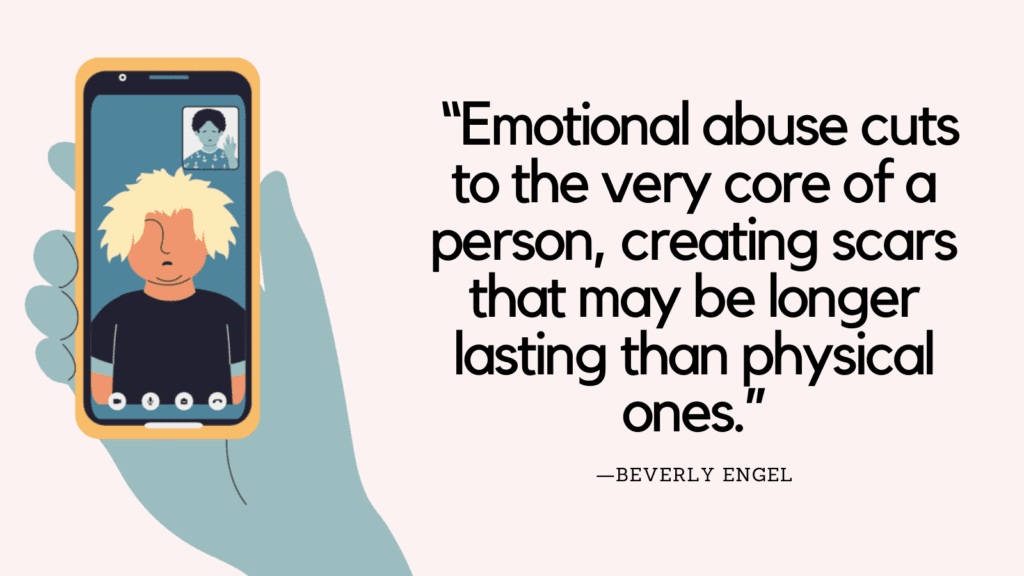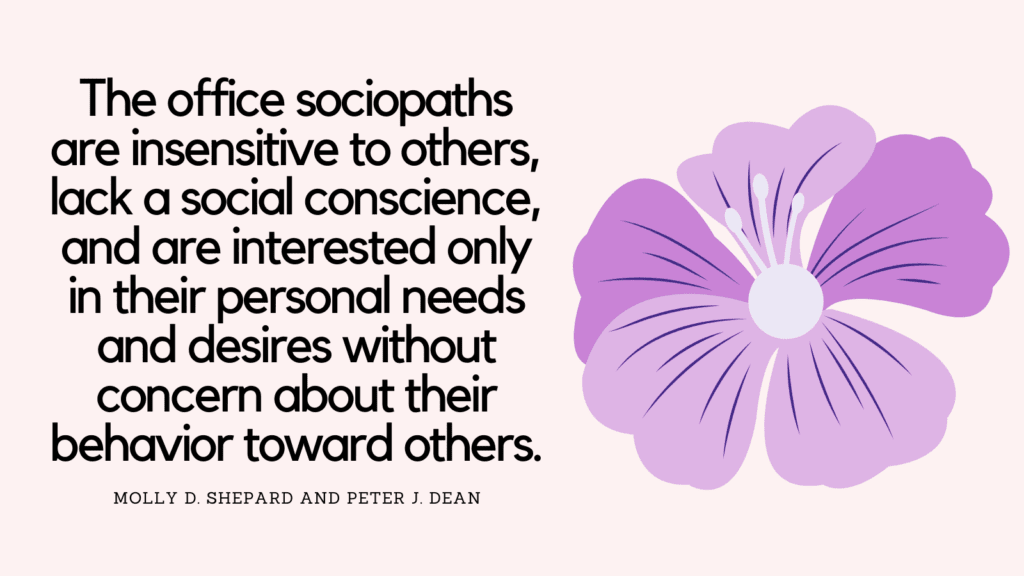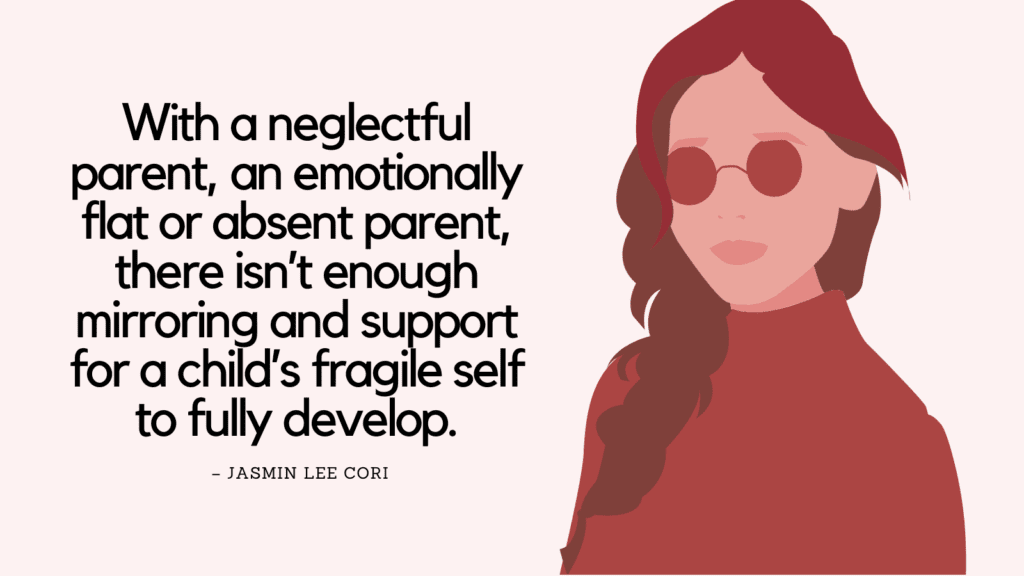This post contains some of the best quotes about being mistreated.
Quotes About Being Mistreated
1. “Paying close attention to how you are feeling when you are in your partner’s presence will alert you to when your partner is beginning to get abusive. This will help you to catch him in the act before he gets too carried away.” ― Beverly Engel
2. “Speak up. The very next time your partner says something that is abusive or treats you in an emotionally abusive way, immediately say to him, “I don’t want you to talk to me that way (or treat me that way). It is abusive (or inconsiderate or disrespectful). I don’t deserve to be treated that way.”” ― Beverly Engel
3. “If your parents continue to be abusive—either emotionally, physically, or sexually—you need to confront them about their unacceptable behavior or temporarily separate from them in order to gain enough strength to confront them.” ― Beverly Engel
Related: Personal Bill of Rights (+PDF Download)
4. “In order to break your pattern of becoming involved with abusive people, you must first recognize your pattern.” ― Beverly Engel
5. “Being alone is so uncomfortable, so frightening to some people that they will put up with almost anything in order to avoid it.” ― Beverly Engel
6. “Many people stay in abusive relationships because they are afraid to be alone. This is probably the most common reason why people put up with abusive behavior from their partner.” ― Beverly Engel
7. “Growing up in an abusive household taught you that there are only two types of people in the world—victims and abusers.” ― Beverly Engel
Related: Emotional Abuse In Relationships Quiz
8. “Often we grow up thinking that the way we were treated was normal and to be expected, when in fact it was abusive or neglectful. Emotional abuse is sometimes so innocuous and leaves such invisible scars that many people do not realize they were emotionally abused as a child.” ― Beverly Engel
9. “If you are in an emotionally abusive relationship, it is very likely that you were emotionally abused as a child. This may sound like an extreme statement, but believe me, it is not. The truth is, few people put up with emotional abuse as an adult unless they were abused as a child. And nearly every person who becomes emotionally abusive has a history of such abuse in childhood.” ― Beverly Engel
10. “Those with an abusive past often develop a radar system tuned to pick up any comment or action from others that could be interpreted as being negative.” ― Beverly Engel
11. “A partner may put up with abusive treatment for years before retaliating, or she may retaliate as soon as the abuse begins.” ― Beverly Engel
Related: Covert Verbal Abuse: What Is It & How To Recover From Verbal Abuse
12. “In situations where only one partner is abusive, the abused partner may be unaware that he is being abused, or he may have tried to get the abusive partner to stop—to no avail.” ― Beverly Engel
13. “Most people think of abuse as occurring within a romantic relationship, but friendships can be abusive as well.” ―Jennifer Lombardo
14. “Emotional abuse cuts to the very core of a person, creating scars that may be longer lasting than physical ones.” ―Beverly Engel
15. “Abused partners tend either to take on the criticism and rejection of their partner or to be in constant turmoil.” ―Beverly Engel
16. “Emotional abuse is any nonphysical behavior or attitude that is designed to control, intimidate, subjugate, demean, punish or isolate another person.” ―Beverly Engel
17. “The very thing that glitters oftentimes slitters.” ―Bobby Acres
Related: Am I Being Gaslighted Quiz (& How To Recover From Gaslighting In 10 Steps)
18. “If you continue to allow abusive behavior, you are simply enabling and inviting to continue to mistreat you.” ―Corey Wayne
19. “By your tolerance of their bad behavior, you enable and invite them to continue mistreating you.” ―Corey Wayne
20. “Being able to walk away communicates that you highly value yourself, what you have to offer and that you won’t tolerate being mistreated or taken for granted.” ―Corey Wayne
21. “One should never do wrong in return, nor mistreat any man, no matter how one has been mistreated by him.” ―Socrates
22. “When a person tells you that you hurt them, you don’t get to decide that you didn’t.” ―Louis C.K.
23. “No one should be harassed or mistreated because of who they are, who they love, or what they believe.” ―Mike Pence
24. “Forget what hurt you but never forget what it thaught you.” ―Mason Cooley
Related: Healing From Childhood Emotional Neglect In 6 Steps (+FREE Worksheets PDF)
25. “I’ve gotten the short end of so many sticks that I could start a bonfire.”
― Craig D. Lounsbrough
26. “It’s not other people that hurt us, but what we feel about them.” ―Joseph Fink
27. “Hurt is a bruise on the outside. Harm is a bruise on the inside.” ―Tiffany Reisz
28. “There are more people abusive to others than lie open to abuse themselves; but the humor goes round, and he that laughs at me today will have somebody to laugh at him tomorrow.” ―Seneca The Younger
29. “Some old wounds never truly heal, and bleed again at the slightest word.” ―George R.R. Martin
30. “The reason why parents mistreat their children has less to do with character and temperament than with the fact that they were mistreated themselves and were not permitted to defend themselves.” ―Alice Miller
Related: Healing From Emotional Abuse In 12 Practical Steps

How to Heal After Being Mistreated?
Experiencing mistreatment can be a painful and traumatic experience. Here are some scientifically supported suggestions that can help you heal after being mistreated:
1. Acknowledge Your Feelings: Allow yourself to recognize and validate your emotions, such as anger, sadness, or betrayal. It’s normal to have a range of emotions when you’ve been mistreated, and accepting them is an essential step towards healing.
2. Practice Self-Compassion: Treat yourself kindly and practice self-compassion. Be understanding and forgiving towards yourself for any perceived mistakes or shortcomings related to the mistreatment.
3. Seek Support: Reach out to a trusted friend, family member, or therapist who can provide emotional support and validation. Talking about your experience with someone who is compassionate and understanding can help you process your emotions and gain perspective.
4. Set Boundaries: Establish clear boundaries to protect yourself from further mistreatment. Clearly communicate your boundaries to others and be assertive in enforcing them. Learning to set boundaries will help prevent future mistreatment and promote your overall well-being.
5. Engage in Self-Care: Prioritize self-care activities that nurture your physical, emotional, and mental well-being. This may include exercise, getting enough sleep, practicing relaxation techniques, engaging in hobbies, or spending time in nature.
6. Challenge Negative Thoughts: Identify and challenge any negative thoughts or beliefs that may have developed as a result of the mistreatment. Reframe them into more realistic and positive perspectives. The following prompt may help:
- Is there evidence to support this thought? What are the facts?
- What alternative explanations or interpretations are possible?
- What would I say to a friend who has a similar thought? Would I view it as realistic or distorted?
- How accurate or fair are my thoughts about myself, others, or the world?
- What would be a more balanced or helpful way to think about this situation?
7. Engage in Healthy Coping Mechanisms: Find healthy ways to cope with the pain and emotions associated with the mistreatment. This may include journaling, practicing mindfulness or meditation, engaging in creative outlets, or seeking professional help if needed.
8. Practice Forgiveness (if appropriate): Forgiveness can be a complex process, and it may not be applicable or necessary in every situation. However, if you are ready and willing, forgiveness can help release the emotional burden and promote your own healing. Forgiveness does not mean condoning the mistreatment; rather, it means letting go of the resentment and finding inner peace.
Conclusion
Healing is a personal journey, and it takes time. Be patient with yourself and allow yourself to heal at your own pace.
If you find it challenging to overcome the impact of mistreatment, consider seeking professional help from a licensed psychologist or therapist who can provide guidance and support tailored to your specific needs.



